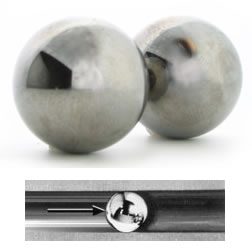
Are you looking for tooling balls? Also known as construction balls, they are used in a wide variety of commercial applications. Tooling balls are used for coining, detents, gage tips and more. For the greatest utility, though, you’ll need to choose the right tooling balls.
With or Without a Stem
You can order tooling balls either with or without a stem. Tooling balls are often connected to a stem. Gaging, for instance, will likely require the use of a stem-connected tooling ball. Some tooling balls come with a stem. Other tooling balls are sold without a stem. Depending on how you intend to use them, you may want to choose tooling balls with a stem.
Consider the Size
Tooling balls are available in different sizes. When choosing them, you should check the ball diameter. The ball diameter is exactly what it sounds like: It’s the diameter of the entire tooling ball. A large ball diameter indicates a large tooling ball.
In addition to a ball diameter, tooling balls often have a hole diameter. This is the diameter of the hole in a tooling ball. The hole diameter must match the shaft with which you intend to use a tooling ball.
Choose a Durable Material
You should choose tooling balls made of a durable material. Because they are used in so many commercial applications, tooling balls are naturally exposed to wear and tear. If they are made of a weak or otherwise low-quality material, they may not last. Fortunately, tooling balls are available in strong, durable materials.
Tungsten carbide is a popular material in which tooling balls are made. It consists of carbon and tungsten. Tungsten is already strong by itself. When mixed with carbon, though, it becomes even stronger. Tungsten carbide, in fact, has a Mohs Hardness Scale rating of 9 To put that number into perspective, titanium has a Mohs Hardness Scale rating of just 6.
Corrosion Resistance
Some tooling balls are made with an emphasis on corrosion resistance. Corrosion resistance is achieved by using a different binder formulation. Most tooling balls, of course, are made of tungsten carbide. Tungsten carbide is a material consisting of tungsten and carbon. For greater protection against corrosion, though, some of them are made with a more corrosion-resistant binder formulation.
In Conclusion
If you’re going to buy tooling balls, you should choose the right type. Some tooling balls have a stem, whereas others don’t. You can also find them in different sizes, materials and more.
